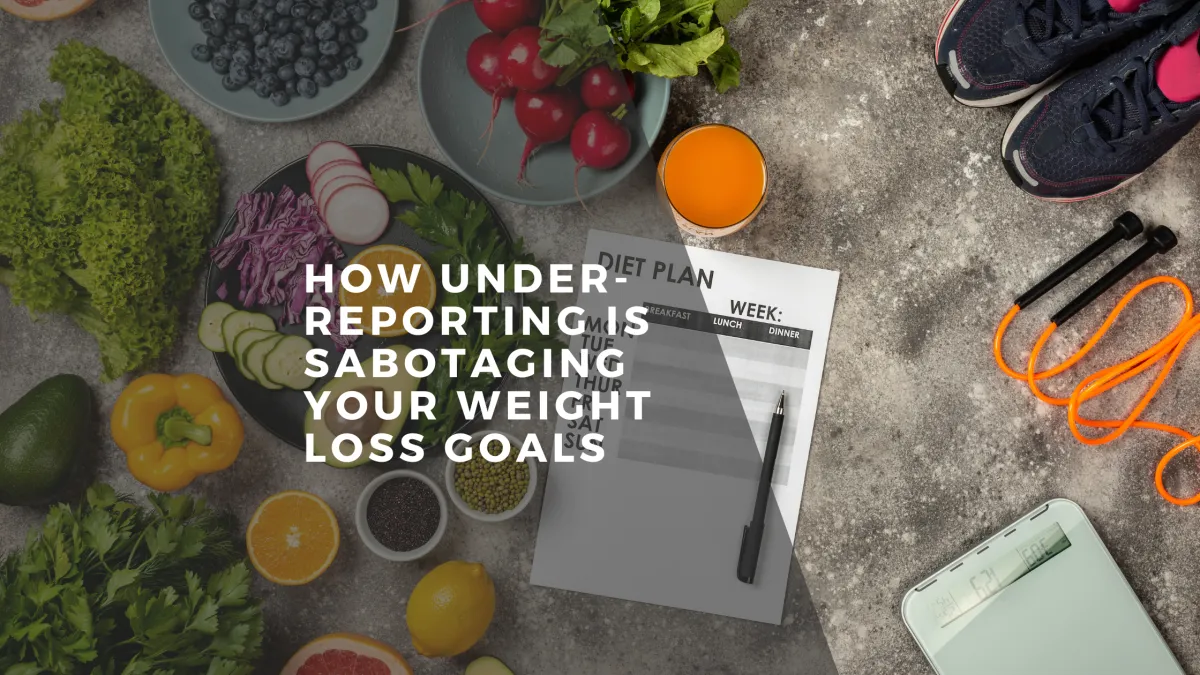Bicester's #1 Body Transformation Centre
Discover Your Best Self with Personalised Nutrition, Fitness, Support In A Private Gym In Bicester

How Under-Reporting is Sabotaging Your Weight Loss Goals
Many of us are diligent about tracking our diet and exercise, but still find ourselves stuck at a weight plateau or even gaining weight. The culprit might be something you haven’t considered: under-reporting. This common issue involves unintentional inaccuracies in reporting how much we eat and exercise. It can significantly undermine your weight loss efforts, making it crucial to understand and address this behaviour.
What is Under-Reporting?
Under-reporting refers to the discrepancy between the calories people think they are consuming and the actual amount they eat. Studies show that even dietitians, who are trained to monitor food intake, can underestimate their caloric consumption by up to 20%. This can occur due to forgetting small snacks, underestimating portion sizes, or not accounting for liquid calories like drinks and condiments.
Key Points:
Unconscious Errors: Often, people genuinely believe they are adhering to their diet, but fail to account for small snacks or extras.
Portion Size Misjudgement: Many underestimate the size of their portions, leading to higher calorie intake than reported.
Hidden Calories: Drinks, dressings, and cooking oils can add significant calories without being recorded.
The Impact of Under-Reporting on Weight Loss
When you consume more calories than you realize, it becomes nearly impossible to maintain a caloric deficit necessary for weight loss. For example, a study published in the New England Journal of Medicine found that individuals who reported difficulty losing weight underestimated their intake by an average of 47% and overestimated their physical activity by 51%.
Real-World Examples:
Case Study: Jane, a participant in a weight loss study, was confident she was consuming 1,500 calories per day. However, when her diet was closely monitored, her actual intake was closer to 2,200 calories due to untracked snacks and drinks.
Scientific Evidence: Research consistently shows a significant gap between self-reported and actual caloric intake, contributing to weight loss resistance.
Common Sources of Under-Reporting
1. Portion Sizes
People often underestimate how much food they consume. A “handful” of nuts might seem small but can contain hundreds of calories. Misjudging portion sizes can easily lead to significant under-reporting.
2. Liquid Calories
Many forget to account for calories from beverages like lattes, smoothies, or even alcoholic drinks. These can add up quickly and often go unnoticed in calorie logs.
3. Snacking and Tasting
Small bites taken while cooking or passing through the kitchen can contribute more calories than you might think. These unrecorded nibbles can add up over the course of a day.
4. Dining Out
Restaurant portions are typically larger and more calorie-dense than home-cooked meals. It’s easy to underestimate the caloric content of meals eaten outside.
5. Forgetting to Log
Sometimes, we forget to log certain meals or snacks altogether. This can create a false sense of adherence to a diet plan.
How to Improve Reporting Accuracy
Accurate reporting can significantly enhance your weight loss progress. Here are some practical strategies:
1. Use a Food Scale
Measuring your food with a scale can help you understand actual portion sizes. This practice can correct any misjudgements and provide more accurate data.
2. Log Everything Immediately
Record your food and drink intake as soon as you consume it. Apps like MyFitnessPal or a simple food diary can be invaluable tools for this.
3. Be Mindful of Liquid Calories
Track all drinks, including those you might not consider significant, like fruit juices, sodas, or alcoholic beverages.
4. Photograph Your Meals
Taking photos of your meals can help you recall what you ate and identify potential discrepancies in your logs later.
5. Regular Check-Ins
Review your food diary regularly to ensure you’re capturing all your intake accurately. Compare your logs against your weight loss progress to make necessary adjustments.
Combating Psychological Biases
1. Avoid “Cheat Day” Mentality
Cheat days can sometimes lead to unplanned calorie binges. Instead, aim for a more balanced approach to treats and indulgences within your daily calorie budget.
2. Address Emotional Eating
Emotional eating can lead to unplanned snacks that are often not logged. Finding healthy ways to cope with stress or emotions can help maintain better reporting habits.
3. Set Realistic Goals
Setting achievable goals and being honest about your dietary habits can prevent the frustration that leads to under-reporting.
Conclusion
Under-reporting is a common yet significant barrier to successful weight loss. By understanding its sources and implementing strategies to improve accuracy, you can overcome this challenge and better achieve your fitness goals. Remember, honesty in tracking is crucial, being accountable — not just with the numbers but with yourself. Accurate reporting leads to more effective weight management and ultimately, a healthier lifestyle.

Copyright 2025 | 1st4Fitness LTD | All Rights Reserved | Privacy Policy | Terms & Conditions



